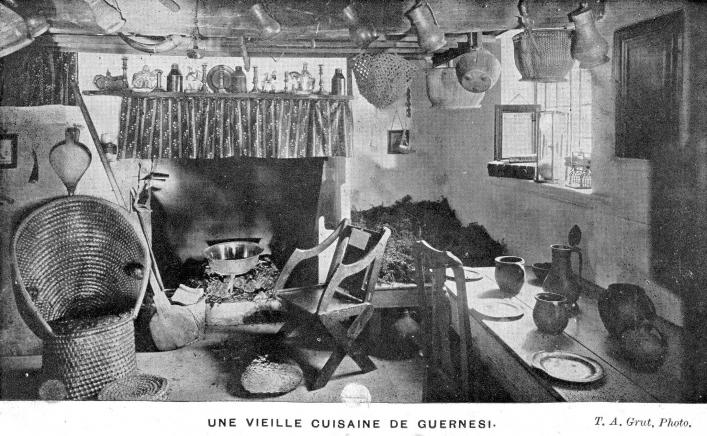The Guernsey farmhouse and cottage, 1846

Continuing the extract from the Dublin University Magazine, 1846. The Guernsey diet and the lower classes' utter lack of musicality.
If we enter now into a farm-house or cottage, we shall find the internal arrangements answer the external effect. Even in the smallest habitations it is rare not to find a distinct room for day use; and in the superior farm-house, this room is generally spacious and airy. Everywhere great frugality prevails, especially in the culinary department. The ordinary diet is a kind of broth termed soupe à la graisse, composed of vegetables, boiled with a small quantity of lard or bacon. This is occasionally varied by a much more savoury and nourishing potage, made from the conger eel, which is caught in plenty around the island. A substantial meat dinner is scarcely ever seen, except on a few festive days, when, however, the board is often furnished in a way that would not disgrace an English yeoman, beef and plum-pudding being seldom absent. Of these festive occasions the most conspicuous are, of course, Christmas and New Year's Day. The celebration of Christmas differs, in respect to its arrangements, from our customs, inasmuch as the night of chiefest jollity is the one preceding Christmas Eve. This is called 'La Longue Veille,' and none are so poor as not to distinguish it by some special addition to the usual evening's meal. All the scattered members of a family assemble, on this occasion, at the farm of its principal representative, and the jest, the story, and the 'courting' are merrily kept up to a late hour. Dancing, we believe, is an amusement little congenial to the Channel Island peasantry. Mr. Inglis attributes this to 'the prevalence of sectarianism;' but we should be rather disposed to seek a reason in the utter absence of a musical ear.* We never remember to have heard a labourer enlivening his task with a whistle or a song, and we believe nothing in the shape of a national air exists among them.¹
Notwithstanding the cheapness of spirits, the natives of Guernsey are generally very temperate, the universal beverage being a poor kind of home-made cider. But la longue veille calls for more mirth-inspiring potations;— its appropriate drink is mulled wine, prepared after rather a peculiar manner, and invariably handed round in coffee-cups. The fair authoress of the Guernsey and Jersey Guide has kindly given to the world the receipt for this decoction, which our responsive philanthropy bids us aid her in disseminating. Those who have partaken of this Guernsey ambrosia, will not be surprised that the subject was found too inspiring for vulgar prose.
* Since writing the above, we have accidentally met with a similar remark with respect to the Norman peasantry (both, be it remembered, are of the same family)— Vide St. John's Tour in Normandy, p. 129.
A continuation of The Guernsey peasant and patois.
¹ Not so! The 'national air' was a ditty much favoured by the militia called Jean, Gros Jean, which is still known in the island today. See Edith Carey, A link with the past, p. 16, for words and music.
For more about cottages, see particularly Carel Toms' Reflections of Guernsey's past, Guernsey; Guernsey Press, 1995; for the history of the farmhouse in Guernsey, see The Guernsey farmhouse, London: Guernsey Society, 1963.
